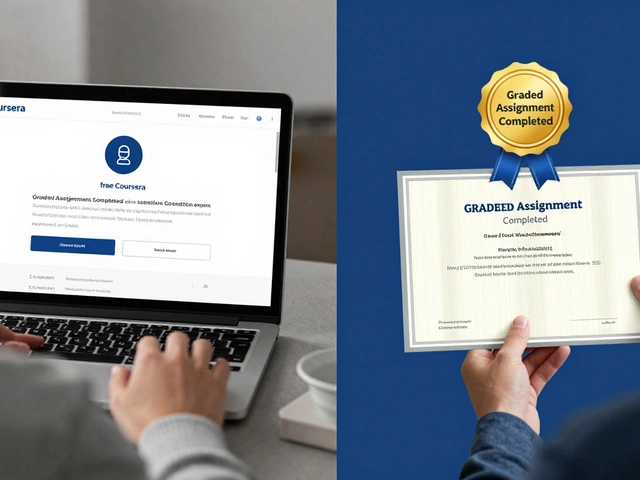Getting into IIT on your first try is the dream, right? But how do you turn that dream into reality? It starts with understanding the JEE exam pattern. Why is this crucial? Simple. You need to know what you're up against before you can conquer it. Spend time familiarizing yourself with the types of questions, the marking scheme, and the timing of each section.
Now, let’s talk about study plans. Random study sessions won’t cut it. You need a plan that’s both realistic and tailored to your strengths and weaknesses. Allocate time wisely, ensuring that each subject gets its due attention. Remember, quality over quantity. It's not about how many hours you study, but how effectively you use them.
- Understand the Exam Pattern
- Create a Realistic Study Plan
- Focus on Conceptual Clarity
- Practice with Mock Tests
- Maintain Balance and Stay Motivated
Understand the Exam Pattern
Before you can ace the IIT JEE, you’ve got to know the exam pattern inside out. This ain’t just another test; the stakes are high, and the format is unique.
First things first, the JEE is split into two parts: JEE Main and JEE Advanced. JEE Main is your ticket to the big leagues, the first hurdle on the track to getting into IIT. It consists of multiple-choice questions from Physics, Chemistry, and Mathematics. Timing matters here, since you’ve typically got about three hours to tackle the lot.
Details on JEE Main
Let's break it down some more. For JEE Main:
- Papers usually include 90 questions—30 from each subject.
- A correct answer nets you 4 points.
- Incorrect answers can cost you 1 point, so guess wisely!
- You earn zero for unanswered questions, so when in doubt, it's sometimes better to skip a tricky question.
The Nitty-Gritty of JEE Advanced
Now, onto JEE Advanced. It's more challenging and flexible, with varying question types including multiple-choice, integer-type answers, and even matrix match questions.
An interesting nugget: while JEE Main can be a make-or-break for some universities, cracking JEE Advanced is essential for IIT aspirations.
| Exam Part | Question Type | Duration |
|---|---|---|
| JEE Main | MCQs | 3 hours |
| JEE Advanced | MCQs, Integer type, Matrix | 3 hours per paper |
Understanding the exam pattern not only saves time during prep but also helps you manage pressure on the day of the exam. Be aware of the weights and strategy as you prepare, and remember to tackle each section with focus and efficiency!
Create a Realistic Study Plan
Making a solid study plan is one of the keys to cracking the IIT JEE on your first attempt. Why? Because structured preparation helps you cover the vast syllabus effectively without burning out. So, let's break it down into some actionable steps.
Know Your Syllabus Inside Out
Before you even start planning, get to grips with the entire syllabus. Know exactly what topics you have to cover. This gives you a clear picture of the journey ahead.
Set Clear, Achievable Goals
Set daily, weekly, and monthly goals. This helps keep you on track. For instance, target specific chapters or topics each week rather than cramming everything at once. Remember, the focus should be on quality over quantity.
Allocate Time Smartly
Here's the trick: not all hours are created equal. Identify when you're most productive. Is it early morning or late at night? Use this time to tackle difficult subjects. Also, break down your study periods into manageable chunks of 45-60 minutes with short breaks.
Balance is Key
Don't forget other activities. Make sure to allocate time for physical activities, hobbies, or just chilling with friends. Balance helps reduce stress and keeps your mind fresh.
Sample Study Plan
A rough idea of how a day might look like:
| Time | Activity |
|---|---|
| 6:00 - 6:30 AM | Exercise |
| 7:00 - 8:30 AM | Math Practice |
| 10:00 - 11:30 AM | Physics Problems |
| 2:00 - 3:30 PM | Chemistry Revision |
| 5:00 - 6:00 PM | Mock Test |
| 7:00 - 8:30 PM | Doubt Clearing/Revision |
And lastly, be flexible. If a method isn’t working, don’t be afraid to tweak your plan. It’s all about finding what works best for you and making consistent progress.

Focus on Conceptual Clarity
When you're prepping for the IIT JEE, rote learning isn't your friend. Sure, memorizing formulas might help in the short term, but real success hinges on understanding those concepts deeply. Why? Because the JEE is notorious for its tricky questions that test your grasp on fundamentals more than just surface knowledge.
Dig Into the Concepts
To start, make sure you thoroughly comprehend the basic principles in every subject area—be it Physics, Chemistry, or Mathematics. This means not just knowing ‘what’ but also ‘why’ and ‘how’. Dive into derivations, understand the reasoning, and try explaining these concepts in your own words.
Use Active Learning Techniques
Active learning can be a game-changer. Engage with problems actively, solve a variety of questions, and don't just stick to one type of problem. Use resources like interactive modules and educational videos that break down complex ideas into bite-sized, digestible parts. These tools are particularly effective in visualizing abstract concepts.
Collaborative Study
Study groups can be a huge help. When you discuss topics with peers, you not only solidify your learning but also gain new perspectives and techniques for solving problems. It's like getting the best of both worlds—theory from books and practical insights from fellow aspirants.
Hands-on Practice
Working on application-based problems is crucial. If you can, get your hands on previous years' question papers and mock tests. These aren't just for practice; they’re a way to deeply understand how concepts are tested.
Occasionally, educators suggest maintaining a balance between conceptual study and practice. They emphasize that while practicing is essential, time spent on understanding and internalizing concepts should not be compromised. So, allocate time efficiently to both!
Practice with Mock Tests
Alright, so you're knee-deep in prep for the IIT JEE, and you've heard a thousand times that practicing with mock tests is key. Well, it really is! Why? Because mock tests mirror the actual JEE exam so closely that they almost feel like the real deal. They're designed to test your knowledge, speed, and accuracy under exam conditions, giving you a serious edge.
Mock tests help you identify your strong and weak areas. It's all about learning from your mistakes without the real pressure. After each test, spend some time analyzing your performance. Did you mess up any concepts? Did you run out of time? Answering these questions helps you tweak your strategy.
Get the Real Exam Experience
One major perk of practicing with mock tests is getting used to the exam format and environment. Set up a quiet spot, time yourself, and minimize distractions—pretend you’re actually in the exam hall! This mental simulation makes you more comfortable when the actual test day arrives.
Track Your Progress
Keep tabs on your progress. Many experts suggest taking a mock test at least once a week. As you progress, push yourself to improve your scores gradually. Create a simple chart or use a notebook to record your scores and note improvements or areas that need work. This gives you a clear picture of where you're headed and keeps you motivated.
- Stick to a Schedule: Regular practice is key, so plan your mock tests well in advance, like a couple each month escalating to one per week as you approach the exam.
- Review Thoroughly: After each test, review what you got wrong and understand why. This turns mistakes into learning opportunities.
- Simulate Real Exam Conditions: Dedicate a specific time slot, silence your phone, and mimic the JEE conditions as best as you can.
Incorporating mock tests into your preparation routine won’t just help you know the material; it’ll make you adept at applying that knowledge when it counts the most.

Maintain Balance and Stay Motivated
When gearing up to crack IIT JEE on your first try, maintaining a balance between study and personal life is just as vital as mastering those equations. Ever notice how burnout takes a toll on productivity? That’s why it's essential to include time for rest and hobbies in your schedule.
Set Realistic Goals
Setting achievable targets can keep you on track without overwhelming you. Break tasks into smaller goals; this prevents the pressure from piling up. Accomplishing these bite-sized tasks can give you a confidence boost, keeping you motivated throughout your IIT JEE preparation.
Incorporate Breaks
Studying non-stop isn't productive. Your brain needs breaks to process information. Study for a solid 50 minutes, then take a 10-minute break. Whether it's stretching, grabbing a snack, or just relaxing, use these breaks to recharge.
Stay Connected
Don’t isolate yourself. Maintain a support system by keeping in touch with family and friends. Discussing your stress or doubts with someone you trust can offer relief and new perspectives.
Visualize Success
Visualization is a powerful tool. Imagine yourself succeeding and walking into your dream IIT. Such positive thinking can keep you motivated, even on tough days.
Remember, maintaining a balance while staying dedicated to your goals is the key to successfully achieving what you set out for. Balancing effort with relaxation and motivation with persistence ensures you don't burn out before you get there.




